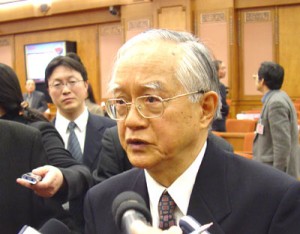In the past few months, China’s senior-most officials have all identified structural economic reform as one of the nation’s most important priorities. Hu Jintao, Wen Jiabao, premier-in-waiting Li Keqiang, and Minister for Industry and Information Technology Li Yizhong have each publicly stressed the need for domestic demand to supplant exports as China’s main engine of economic prosperity.
It would seem such unity of purpose among China’s leadership classes would indicate substantial resolve to push through the reforms required. Yet such political will is exactly what is missing. The demand-boosting reform seriously contemplated by policymakers only goes as far as one-off measures that won’t permanently increase consumption, such as rebates on vehicle or home appliance purchases. Given a widespread belief among China-focused economists that fostering domestic demand in the long-term will require short-term pain, many experts are quietly pessimistic about the government’s ability to make good on its goals.

Wu Jinglian
Wu Jinglian, the octogenarian architect of market reform revered by intellectuals as the “conscience” of Chinese economics, recently explained this sentiment in a video interview for New Century magazine. Like many liberal economists, the current State Council economic research fellow believes any rebalancing will falter without dramatic – and nearly impossible – changes to the way the Party-run government does business.
“Unless systemic obstacles are broken down,” Wu declares in his famously blunt fashion, China’s economy “cannot be transformed.” For ‘Market Wu,’ as he was known during the bureaucratic battles over reform in the 80’s and 90s, there are four such obstacles preventing China’s economic transition:
1. “The state has too much power over the distribution of resources.” Local and provincial governments have “de facto control” over land sales and lending. In addition to out-and-out corruption, this situation fosters all variety of inefficiencies – rent-seeking, crony capitalism and so on – that on whole make it difficult for the private economy to flourish. Even more worrisome to intellectuals like Wu, the enriched networks of officials and entrepreneurs guard these privileges jealously and are immensely powerful within the Party.
2. “The evaluation system for party officials creates distortions.” It is “common knowledge” knows that local officials are judged almost entirely upon the economic growth rate figure within their jurisdiction. They then have great incentive to consolidate their clout to “make things big and make them quickly,” i.e. to cut corners or pursue wastefully large projects. As with 1., resources are squandered and the private economy suffers.
3. “Local government finances are chronically strained.” Local governments are weighed down with the burden of shouldering education and social safety net costs, for which their tax revenue is usually inadequate. As a result, local governments “do whatever it takes” to supplement revenue, flipping land, issuing debt or otherwise crowding out the private economy. (The increasing and often hidden debt burden of local governments – estimated recently to be about 7 trillion yuan – is a topic that has many Chinese academics and policymakers extremely concerned. Good articles explain this issue here and here).
4. “Resources are priced too cheaply.” Explicit and implicit subsidies for credit, energy, land and other resources are ubiquitous throughout the economy, but the wealth benefits primarily accrue to state-owned or state-connected corporations. For instance, because bank deposit rates are artificially capped, interest income for depositors – which are usually households, the end driver of domestic consumption – is essentially used to subsidize (mostly corporate) lending. This phenomenon underpins large corporations’ profitability and high savings rates, but is the root of much of the economic waste and environmental damage so common in China.
These phenomena are “systemic,” integral features to China’s state-driven, investment-addicted growth model. Even an enlightened cadre of national leaders has little chance of weaning local governments off of the system that has enriched them so well. They are also problems that will inevitably cut into the mass prosperity – and the coveted domestic demand – that might otherwise accompany China’s Great Urbanization.
If Wu and his fellow market-advocates are correct about China’s “trapped transition”, to borrow Minxin Pei’s famous phrasing, expect things in China to get worse before they get better. Many experts believe the government will be hard-pressed to afford the clean-up following another export- and investment-driven growth cycle. Worse, continued anemic demand, a reflection of stagnant wages and persistent income inequality, would augur yet more social unrest. Such internal fragility already spooks China’s leadership into taking an aggressive line externally on trade and other issues; the prospects of a stalled-out economy could push them towards desperation.